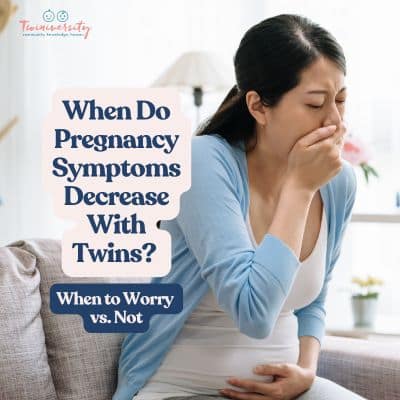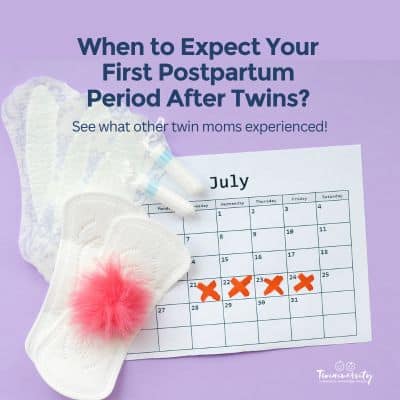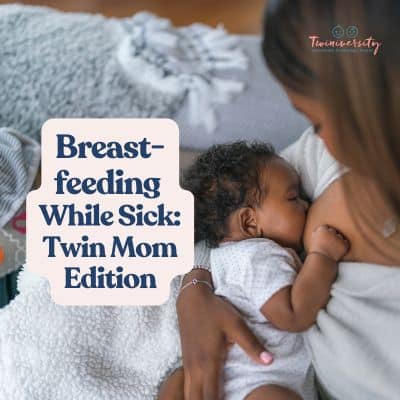Last updated on May 27th, 2025 at 05:44 pm
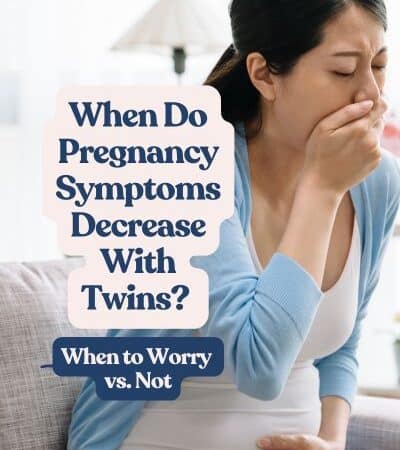
Noticing a sudden decrease in symptoms during your twin pregnancy may have you feeling concerned. So if you’re wondering: when do pregnancy symptoms decrease?, we’ve got you covered with all the reasons and what it could mean at different stages of your twin pregnancy.
You’ve come to terms with the fact that you’re having not one but TWO babies! And for the past few weeks these tiny little humans have been causing all sorts of uncomfortable symptoms for you. From extreme exhaustion to nausea and morning sickness to lots of bloating and a belly that seems to be very quickly popping through, it’s been a whirlwind of changes.
But then you hit a point where those symptoms seem to feel a little less feisty. Maybe they’ve almost entirely disappeared. And while you may be thankful for the relief, now you’re worried that something’s up. After all, even though those pesky symptoms were a lot to handle, at least you had a daily reminder that everything was running smoothly.

The good news is that there are a variety of reasons you could feel a decrease in symptoms during your twin pregnancy. And in many instances, there’s no reason to worry!
But we know that twin pregnancies are already stressful enough, so keep reading, and you’ll better understand why your twin pregnancy symptoms may decrease or change during each trimester.
Before all that though, let’s do a quick refresher on why you experience symptoms in the first place!
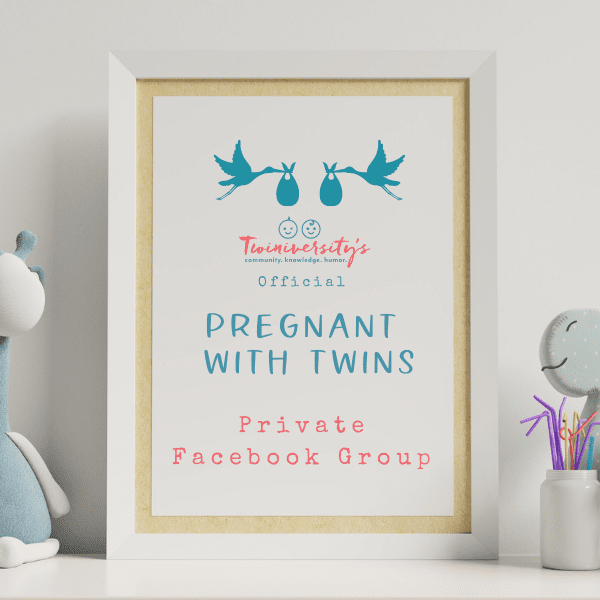
Did you know we have a FREE Facebook group just for expecting twin parents? Hurry and join today to find support from expecting twin mamas who get it!
Pregnancy symptoms 101
You officially become pregnant when the embryo (or embryos) successfully implant into your uterine lining.
After successful implantation, your body begins to produce the pregnancy hormone, human chorionic gonadotropin (hCG). In a singleton pregnancy, hCG levels nearly double every 48 hours from that point on. In a twin pregnancy though, the rate of hCG doubling can happen even more rapidly. (This is why an early sign of twin pregnancy is having much higher hCG levels).
But even before that, ever since ovulation, your body was producing another hormone called progesterone.
Progesterone is secreted by a structure called the corpus luteum (a fancy term that refers to the ovarian follicle that ruptured and released an egg that cycle). In a dizygotic twin pregnancy, you would have two corpus luteums since you released two eggs.
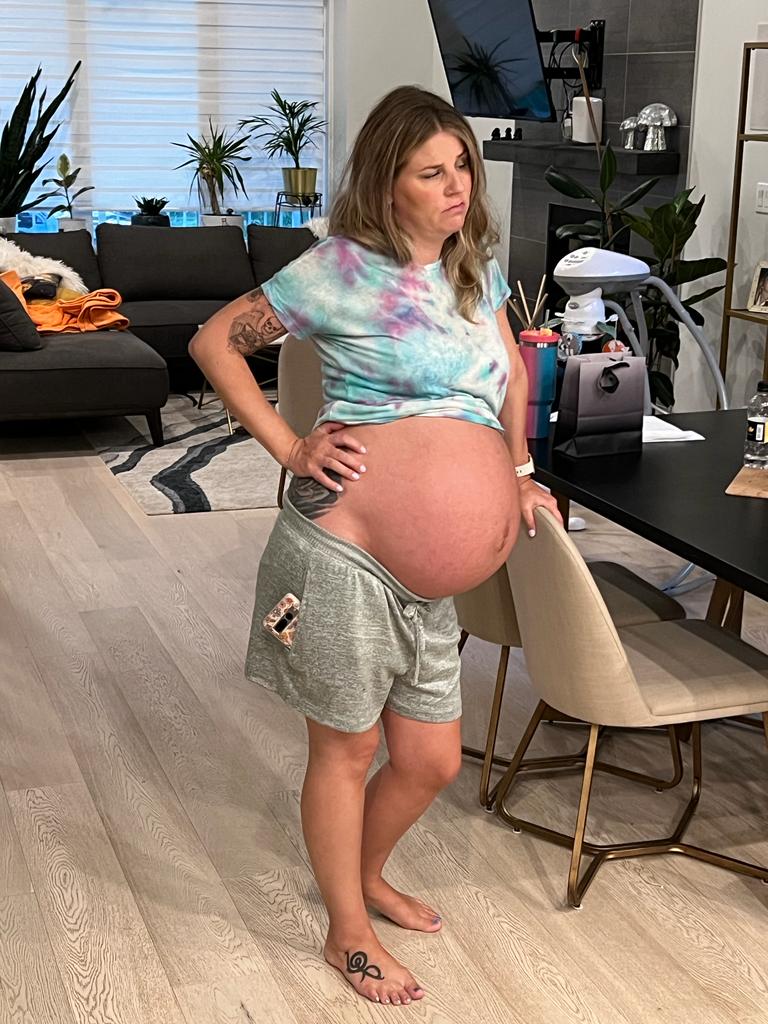
Together, these two hormones—hCG and progesterone—are responsible for many of the symptoms you feel during pregnancy!
Here’s a quick glimpse into which symptoms each of these hormones is the culprit for:
| Progesterone | Both | hCG |
| Bloating Constipation or indigestion Skin breakouts Increased appetite | Fatigue Mood changes Increased urination Breast tenderness or swelling | Nausea Vomiting |
Besides these common early pregnancy symptoms, of course your expanding uterus and increasing weight can cause an array of other discomforts during pregnancy as well.
Want to see what other twin moms experienced during their twin pregnancy? Check out our Twin Pregnancy Week-by-Week Timeline!
Next, let’s look at how your twin pregnancy symptoms evolve and reasons they may dip in each trimester.
First trimester
Remember how we said that the corpus luteum is responsible for producing progesterone in early pregnancy? Well, around the middle of the first trimester, that begins to change.
Somewhere between Week 6 and Week 8, the developing placenta takes over producing progesterone and the corpus luteum will begin to break down. This is called the luteal-placental shift, and it can cause a temporary dip in your progesterone levels.
During this transition, you could experience a decrease in your pregnancy symptoms for about a week due to your progesterone symptoms almost plateauing for a few days.
But after the luteal-placental shift, your overall progesterone levels will continue to rise again, and your symptoms are likely to return or increase.
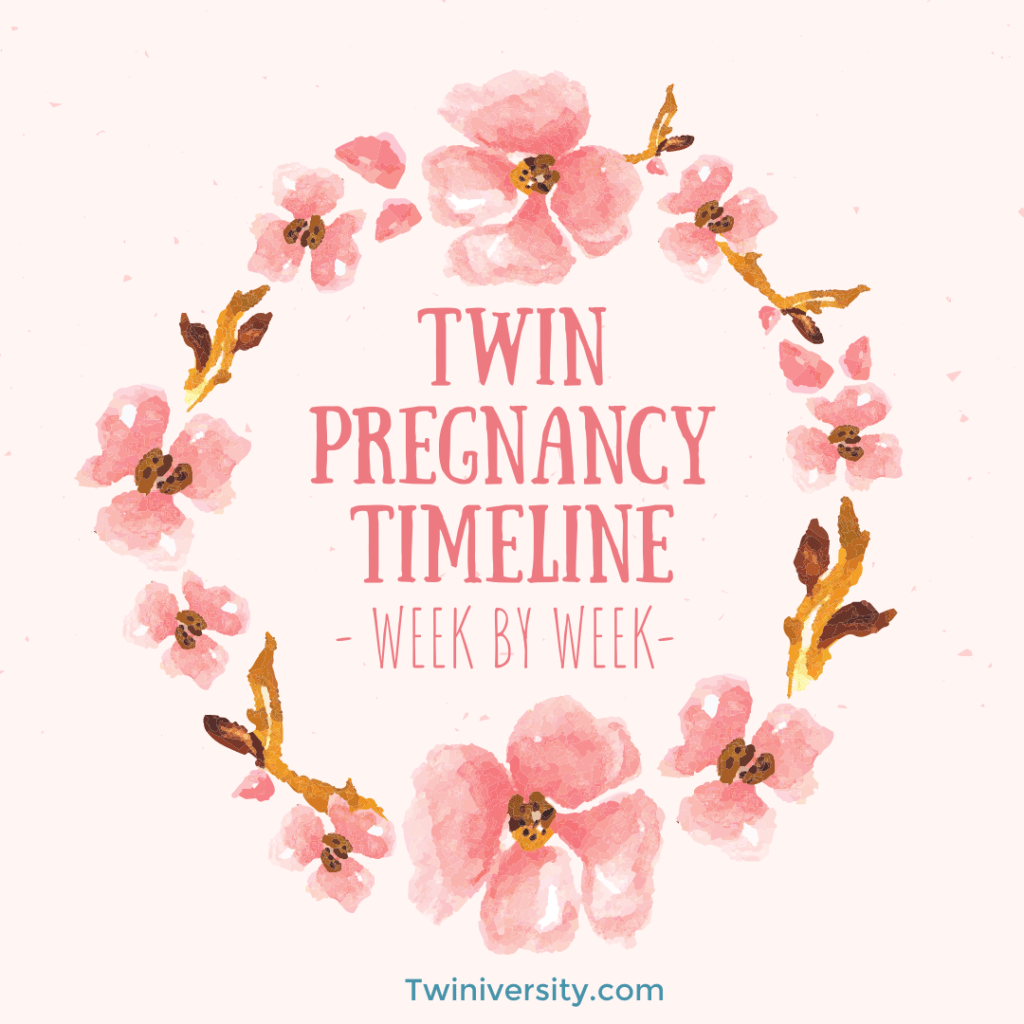
If you just heard that second heartbeat for the first time, or you know it’s been two for a while, you need to read our twin pregnancy week by week timeline to help you learn what happens week by week with twins. Click here to learn more… and while you’re at it, check out our expecting twins classes and twin parent coaching services.
One pressing concern you may have in the first trimester into the second trimester though is Vanishing Twin Syndrome. This is when you miscarry one of the fetuses (usually due to chromosomal abnormalities).
If you’re concerned about VTS, a decrease in pregnancy symptoms alone isn’t usually a sign that you’re miscarrying one of your twins. With Vanishing Twin Syndrome, you are likely to experience a sudden drop in your hCG levels along with other symptoms like uterine cramping, bleeding, or pelvic pain.
While it’s always scary to think about a potential complication like this, if you’re concerned about your decreasing symptoms, it’s always best to check in with your OB. If necessary, they can have you come in and run some diagnostic tests like a blood test or ultrasound to check in on your twins.
If you feel silly for all the worry, don’t! It’s better to err on the side of caution and get peace of mind than to worry and suffer in silence.
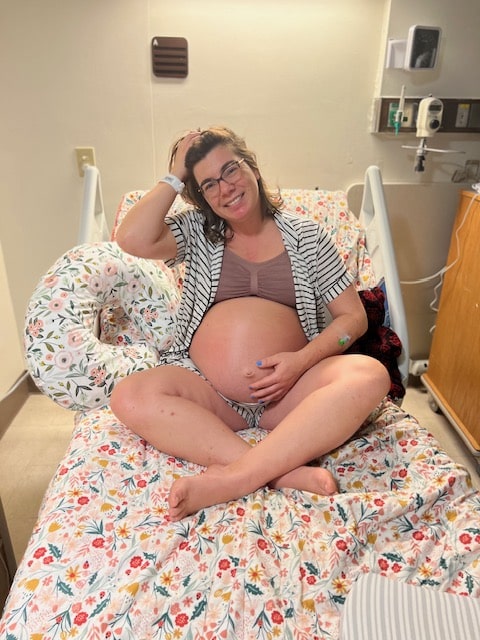
Second trimester
For most pregnant folks, morning sickness peaks somewhere between the first month and 16 weeks of pregnancy.
After this time, many (not all) women will begin to adjust to these hormonal changes and begin to notice less of those symptoms that were so strong in the first trimester.
In place of symptoms like nausea and vomiting though, you’re likely to experience other symptoms related to your growing babies. And since you are carrying two babies, these newer symptoms may come on even sooner than with a singleton pregnancy.
Symptoms like body aches, round ligament pain, darker patches of skin or darker areolas, the appearance of the linea negra, stretch marks, and Braxton Hick’s contractions can be prominent in your second trimester with twins.
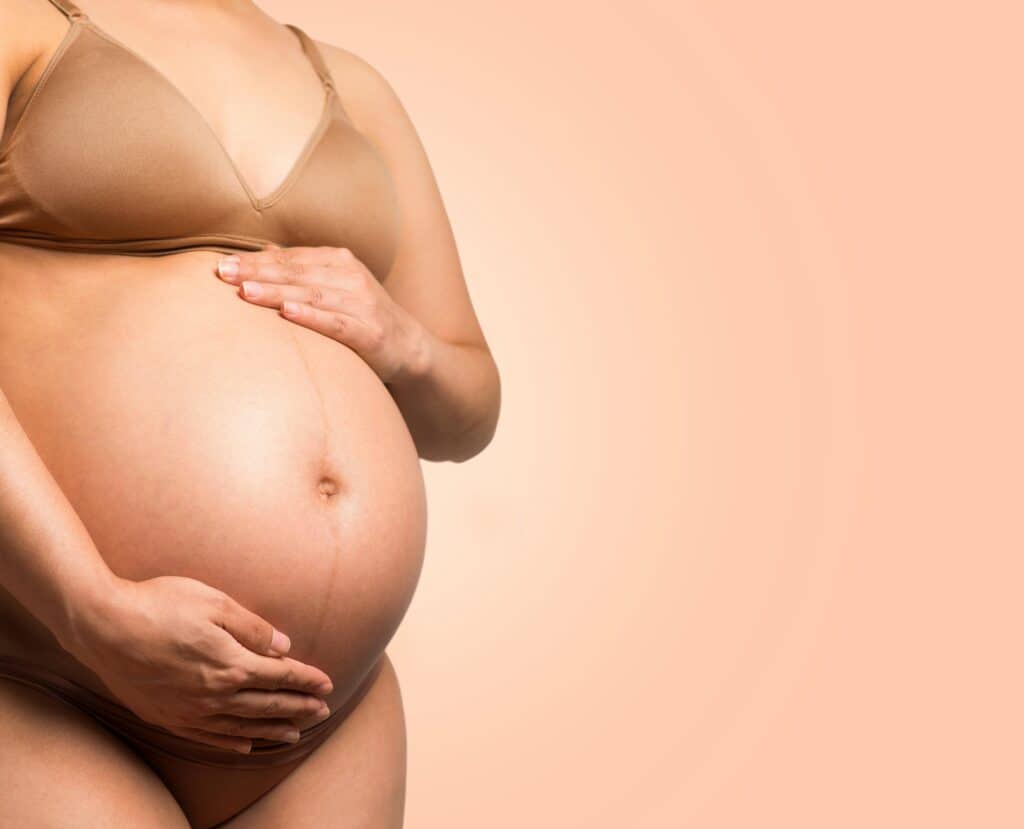
In your second trimester, you will eventually begin to feel your twins kicking. This is called quickening and usually happens between 16 to 24 weeks of pregnancy.
It can be exciting when you feel your twinnies move for the first time! But soon after, you may find yourself stressing over if you’re actually feeling both babies moving or not. Know that this is an extremely common concern in twin pregnancy.
Once you’ve begun to regularly feel your babies moving, if you notice a decrease in their movement or can’t feel them moving at all, definitely check in with your doctor.
Again, it’s always better to speak up and ask to be seen than to worry. You’re not being pesty by calling your doctor or going into OB triage to check in on your twinnies.
We recently polled our Twiniversity community to see how many other twin moms experienced a decrease in pregnancy symptoms in the first trimester or second trimester.
Here’s what they* said:
| Did you experience a decrease in symptoms? | Percent of twin moms |
| Yes, but short-lived, symptoms came back! | 18% |
| Yep and they never truly came back | 30% |
| Nope, had symptoms all the way through | 26% |
| Fluctuated up and down throughout pregnancy | 26% |
* Based on over 350 responses
Third trimester
Many of the symptoms you felt in the second trimester will continue on into your third trimester. But you could also notice new symptoms like your belly button popping out, even more trouble sleeping, shortness of breath, increased urination, and the babies “dropping” into your lower abdomen.
These symptoms are mainly due to the growing size of your babies and the pressure they are putting on your organs like your bladder and uterus.
Your babies’ pattern of movement may also begin to change in the third trimester as they grow bigger and have less space to move around. But again, if you notice any concerning or sudden changes in their pattern of movement, be encouraged to check in with your OB.
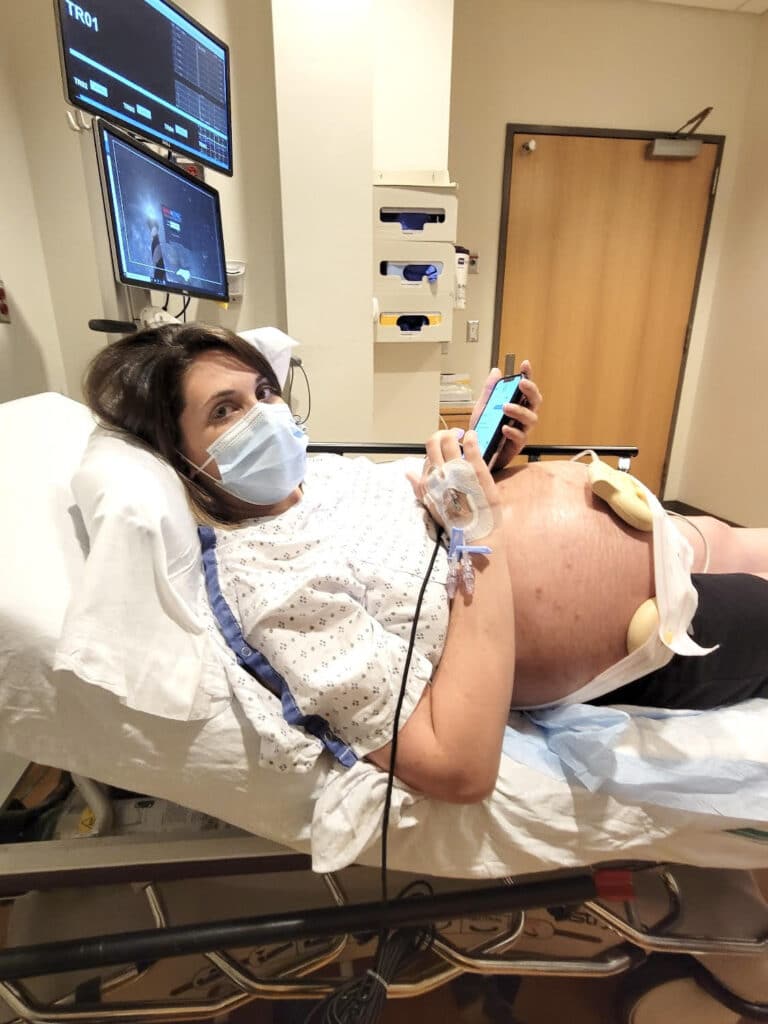
More questions about twin pregnancy symptoms decreasing
When should I worry about decreasing pregnancy symptoms?
A decrease in pregnancy symptoms isn’t always an indicator of a problem. In cases of a miscarriage, there’s often other accompanying signs like abdominal pain, uterine contractions, or bleeding.
That said, if you notice a sudden drop in symptoms or less fetal movement, it’s always best to check in with your doctor. Like twin expert Natalie Diaz says, “It’s better to overreact 100% of the time than to underreact once.”
When do pregnancy symptoms decrease?
Pregnancy symptoms can temporarily decrease around 6 – 8 weeks when the placenta takes over progesterone production.
They can also decrease later in the first trimester or early in the second trimester due to your body becoming accustomed to the higher amount of hormones circulating in your body.
What if I don’t have a lot of the usual twin pregnancy symptoms like morning sickness?
This isn’t a sign that there’s anything wrong! Every individual has a different level of sensitivity to various hormones.
So while a certain amount of hCG or progesterone may cause one woman to throw up once or twice a day, for another woman, it may cause a very subtle nausea. It really depends on each individual.
Want to explore more resources for twin pregnancy symptoms? Check these articles out too:
- Can I Stop Morning Sickness?
- Twin Pregnancy Symptoms: 10 Surprising Signs it Might Be Two
- 4 Weird Pregnancy Symptoms No One Warned Me About

Paige Figueroa is a mom to fraternal twins. After teaching English for 9 years, she now works from home as a content marketing strategist and entrepreneur so she can spend more time with her children. She loves helping other moms and women enjoy more freedom in their lives by monetizing their passions. You can follow her on IG and TikTok @mombossfreedom.

